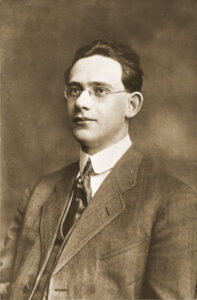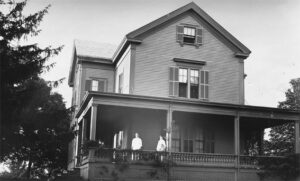Benjamin Whorf

Benjamin Whorf(1897-1941)
Benjamin Whorf was a linguist and a fire prevention engineer. Benjamin Whorf was born on April 24, 1897, in Winthrop, Massachusetts. Benjamin had been an intellectual from the start, it seems. He would conduct experiments with chemicals from his father’s photographic equipment. He was also an avid reader, interested in botany, astrology, and Middle American prehistory. Benjamin had studied at the Massachusetts Institute of Technology with a degree in chemical engineering. He was particularly good at the job and was highly commended by his employers. His job required him to travel to production facilities throughout New England to be inspected. One anecdote describes him arriving at a chemical plant in which he was denied access by the director because he would not allow anyone to see the production procedure which was a trade secret. Having been told what the plant produced, Whorf wrote a chemical formula on a piece of paper, saying to the director: “I think this is what you’re doing”. The surprised director asked Whorf how he knew about the secret procedure, and he simply answered: “You couldn’t do it in any other way.” To support his wife and three kids at the time, he had taken a position as an inspector to the Hartford Fire Insurance Company(Wikimedia, 2021). Although chemical engineering was his career and he was labeled a scientist, he was a very spiritual man. Around 1924, Benjamin first started delving into linguistics when he was seeking to uncover the mysteries of biblical texts. Whorf attended Yale when Sapir (2nd author of Sapir-Whorf Theory) became a professor there. Benjamin enrolled in a graduate studies program not for his Ph.D. in linguistics but for the intellectual company. He joined a circle of other linguists under Sapir and was very well respected. At Yale, Whorf also took numerous projects as a workload to understand linguistics more and clearly come up with ideas. Not only did Saapir have a profound undertaking to him, so did many other scientists who showed that Whorf by some measure was brilliant. Whorf did not see it this way always. As Whorf became more influenced by positivist science he also distanced himself from some approaches to language and meaning that he saw as lacking in rigor and insight. Although works were dissatisfied, it was not till 1929 when the Sapir-Whorf hypothesis became known and it showed many people how human flaws can’t also affect many intrinsic and extrinsic factors.

Edward Sapir(1884-1934)
Understanding Benjamin Whorf, we first need to understand Edward Sapir. Under the influence of Edward Sapir, at Yale University, Whorf developed the concept of the equation of culture and language, which became known as the Whorf hypothesis, or the Sapir–Whorf hypothesis. Sapir was one of the foremost American linguists and anthropologists of his time, most widely known for his contributions to the study of North American Indian languages. A founder of ethnolinguistics, which considers the relationship of culture to language, he was also a principal developer of the American (descriptive) school of structural linguistics(Britaannica, 2021). Whorf maintained that the structure of a language tends to condition the ways in which a speaker of that language thinks(Britannica, 2021). Through Sapir, Benjamin Whorf not only conducted the works of the Hopi Controversy but found that he started writing a hypothesis with him. Edward Sapir and his pupil Benjamin Lee Whorf developed the hypothesis that language influences thought rather than the reverse(Wright, 2015). This paper had a lot of backlash from
the linguistic community and impune slander on Benjamin Whorf’s name. Even if it will ever be
proven wrong, The Whorfian Hypothesis on a timeline will be a monumental step towards
linguistics and how we see it.

Benjamin Whorf – Hartford, CT

Whorf Household – Winthrop, MA
Works Cited:
Britannica, T. Editors of Encyclopaedia (2021, July 22). Benjamin Lee Whorf. Encyclopedia Britannica. https://www.britannica.com/biography/Benjamin-Lee-Whorf
Britannica, T. Editors of Encyclopaedia (2021, January 31). Edward Sapir. Encyclopedia Britannica. https://www.britannica.com/biography/Edward-Sapir
Wright, J. D. (2015). International Encyclopedia of the Social & Behavioral Sciences. Elsevier.
Wikimedia Foundation. (2021, September 4). Benjamin Lee Whorf. Wikipedia. Retrieved December 13, 2021, from https://en.wikipedia.org/wiki/Benjamin_Lee_Whorf.